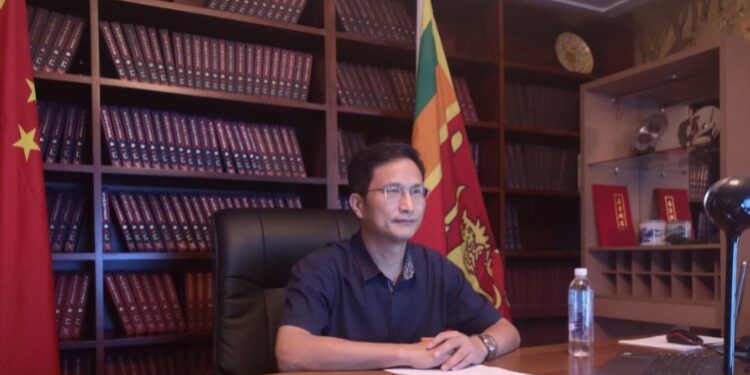The Chinese Ambassador to Sri Lanka, Qi Zhenhong, told the Sri Lanka Investment Forum 2021 this week here that while the island nation is well positioned geographically to develop into an international investment hub, it has to remove certain impediments such as policy inconsistency, administrative inefficiency and indulgence in biased anti-Chinese propaganda.
“Sri Lanka’s industry is not strong. Its development of the supply chain and supporting facilities is far from perfect. Second, although the policies to attract foreign investment are in place, the following problems still exist at the stage of implementation: lack of concrete measures, cumbersome administrative procedures, lengthy coordination process among government agencies and inefficiency in decision-making etc. Much remains to be done in terms of investment facilitation. Thirdly, Sri Lanka has a dynamic environment of public opinion. Among the diversified views, unfortunately, there are at times baseless accusations and attacks on Chinese businesses.”
“Only with the guarantee of the right policies, could we expect foreign investment to take root and bear fruit. Therefore, it is important for the Sri Lankan government to ensure the consistency, stability, transparency and effectiveness of its investment policies to the largest extent. As such, China and Sri Lanka need to continue our efforts promptly to carry out the outline of the medium and long-term plan for investment cooperation and development between our two countries signed in 2017. At the same time, negotiations on the China-Sri Lanka FTA should be resumed as soon as possible. If a timely agreement can be reached, it will surely further promote our bilateral trade and investment.”
“Only by creating an easy-to-do-business environment and providing favorable conditions for investors, the host country can obtain an early advantage from the get go, in the increasingly competitive world to attract international investment. As mentioned earlier, we count on the Sri Lankan government’s efforts to further streamline its review and approval processes, promote digitalization in the administration and improve the efficiency of government services provided (for instance, to establish the electronic one-stop-shop for investors), with the view to minimizing the cost of communication and coordination between businesses and authorities.”
“Third, to better cultivate the pro-business atmosphereattacks targeting Chinese businesses in the media while discussing the Colombo Port City and Hambantota Port from time to time. The accusation sometimes even labels the Chinese government for creating “debt trap” and “colonialization” in Sri Lanka. Those groundless accusations have to some extent affected the healthy atmosphere for our extensive cooperation. As a matter of fact, those Chinese companies took on the projects at the request of the Sri Lankan government in an hour of need, rather than “taking advantages” as claimed by some.”
“The Belt and Road Initiative is guided by the principles of extensive consultation, joint contribution and shared benefits, with the view to achieving the win-win outcome, rather than the “zero-sum” game. I believe, in order to properly address the difficulties encountered in bilateral cooperation, both sides should always keep in mind the mutually beneficial nature of our cooperation and our strong partnership as a whole.”
“We should neither overlook the prominent problems arising in key projects because of our friendship, nor can we allow anxiety to cloud our judgement over short-term gains and losses: we need to avoid the mentality of feeling on the losing side when the projects are making progress with promising benefits; or to throw blame around when the projects are moving slow or temporarily hindered.”
However, ending on a note of optimism, the envoy said: “All in all, despite existing challenges, the time has come to invest in Sri Lanka. I sincerely believe, with the strong commitments by the Sri Lankan government to address those challenges, as well as the wisdom of our experienced investors, we are looking at an extremely promising future of our investment cooperation ahead.”


